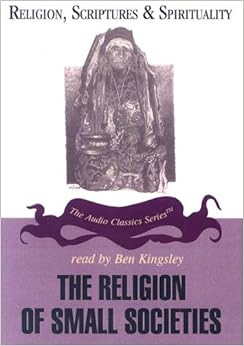I recently listened to The Religion of Small Societies, by Ninian Smart, part of the Audio Classics Series on Religion, Scriptures & Spirituality (and narrated by Ben Kingsley, no less than Gandhi himself, right?). I think it's made for audio (as opposed to other books that are written for reading and only later are made into audiobooks). It was interesting and fairly well done.
I was most interested in the parts that had to do with numinous experiences that people had, where they encountered God/dess or a god/dess. These were really interesting and beautiful to hear about. The author talked about the difference between spirituality and other parts of life in that numinous experience, that experience of the direct presence of the holy. Shamans may have been the ones who most frequently had these numinous experiences, but it sounds like they sometimes happened to ordinary members of the tribe or group, too.
One reason that I wanted to listen to this book was that I have this growing sense that it's the vastness of our society that is one of the reasons we're seeing so many problems in our world. In a small society, there is accountability. Everyone pretty much knows what everyone is up to. There is no hiding in anonymity, and not as much ability to get lost in the shuffle and grow so lonely and depressed that you lash out through a school shooting, for example, or trafficking young children, or where you can take and take more resources than you need in a futile attempt to keep yourself from feeling vulnerable and alone. But in our society, there is no accountability like that, there is no way to make sure that everyone is doing OK, there is no effective mechanism that reminds us that others are hungry and that we must share.
Small societies often have religions that are place-based, that see God/dess in a particular place or that see the divine in the other animate and inanimate entities that make up their world. While perhaps this kind of animism is "primitive," a precursor to a more universal understanding of the divine, a God/dess who is present in all places and not bound to a particular plant, animal, or rock, sometimes I feel like our transcendent understanding of God gets in the way of our ability to connect with God on an immanent plane. When we as Christians became place-less and universal, we became so susceptible to the eventual wedding with empire that occurred with Rome, to the monoculture of convert or die, which wiped out so many of these small religions in the last 2000 years. A victory for Jesus, or just a victory for empire? It's so hard to tell sometimes.
Now as a people we're realizing that our disconnection from the land is harming not only ourselves, but also all the other creatures and non-living entities on the land. (Or at least, it's harming their ability to survive in the way that we have for thousands of years. We will all have to adapt.) Some of us are realizing that what these small societies did, creating accountability with one another, setting up guidelines for how to live in a way that did not overly-deplete the resources of our beloved place, were actually really smart. Perhaps as Americans we grew up learning that Native Americans didn't manage the land, so Europeans had to come in and do so for them, but now we're learning that Native peoples were managing the land, just in such a sustainable way that it looked natural. The size of their groups and the particular rules in place in their communities almost all contributed to maintaining the land for the benefit of all — not just the people but the entire ecosystem.
We obviously can't go back to that kind of society, but I've wondered for a long time what it would look like to live in this kind of tribal way, at least to form our meetings/congregations in such a way that we split in healthy ways when we get too big, and where we actually know one another and supply one another's needs. What if we not only did this for the people, but for the whole ecosystems to which we're connected? Some people are calling this watershed discipleship or place-based theology. What if we paid attention to the numinous experiences we had here, in this place, of the God/dess who is particular to here, and transcends space and time? What might we learn if we paid attention to being followers of Jesus here, rather than in some disembodied future?

No comments:
Post a Comment